Key takeaways:
- An audio news aggregator curates audio content from various sources, enhancing accessibility and convenience for users.
- Government regulations are essential for ensuring media integrity, protecting consumers from misinformation, and fostering innovation in audio news.
- Recent regulations emphasize transparency, data privacy, and diversity in content representation, impacting how aggregators operate and engage with listeners.
- Adapting to new regulations encourages audio news aggregators to enhance trust, user loyalty, and inclusivity in their content offerings.
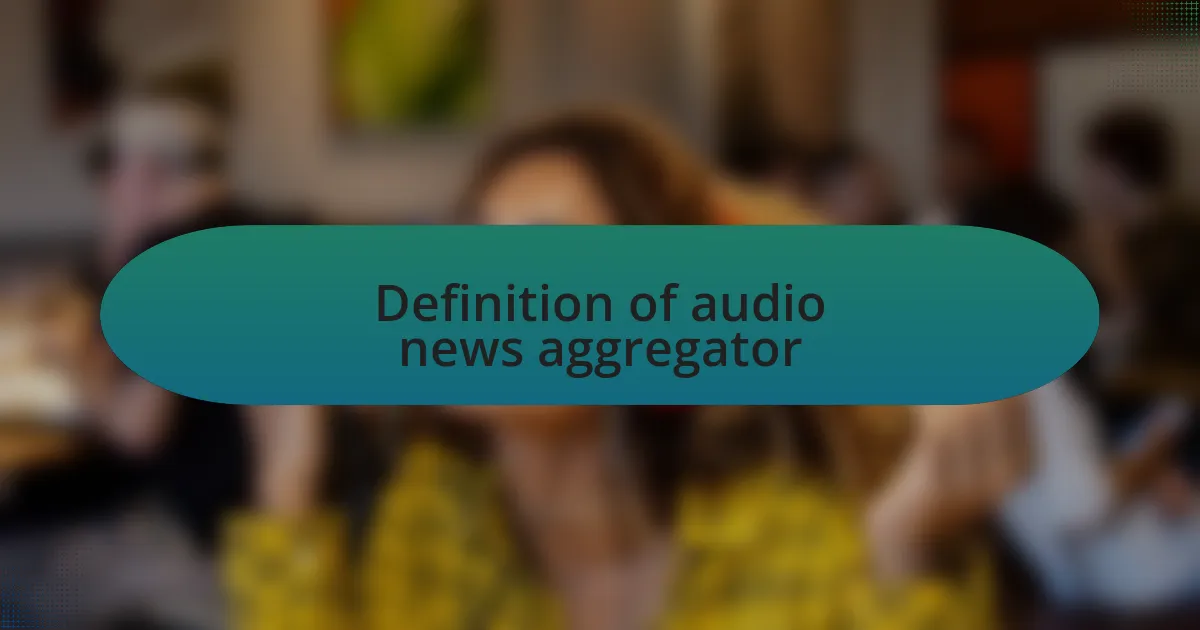
Definition of audio news aggregator
An audio news aggregator is a platform that curates audio content from various news sources, allowing users to listen to the latest updates in one convenient place. Imagine waking up and having that morning coffee while your favorite news pieces play effortlessly, summarizing the world without you having to scroll through endless articles. Isn’t it incredibly satisfying to be informed without the hassle of searching multiple sites?
At its core, an audio news aggregator combines snippets of information from diverse channels, ranging from traditional news outlets to independent podcasts. I often think about how invaluable this service is for busy individuals. It’s like having a personal news concierge who handpicks stories tailored to your interests, saving time and enhancing your understanding of current events.
These platforms are not just about convenience; they enhance accessibility to news in ways traditional sources can’t. For instance, I recall one moment driving home from a long day when I discovered a podcast episode that delved deeply into a topic I hadn’t considered. It shifted my perspective entirely and made me realize how powerful an audio news aggregator can be in enriching our lives. Wouldn’t you agree that the ability to learn and connect with current events while multitasking is a game changer?
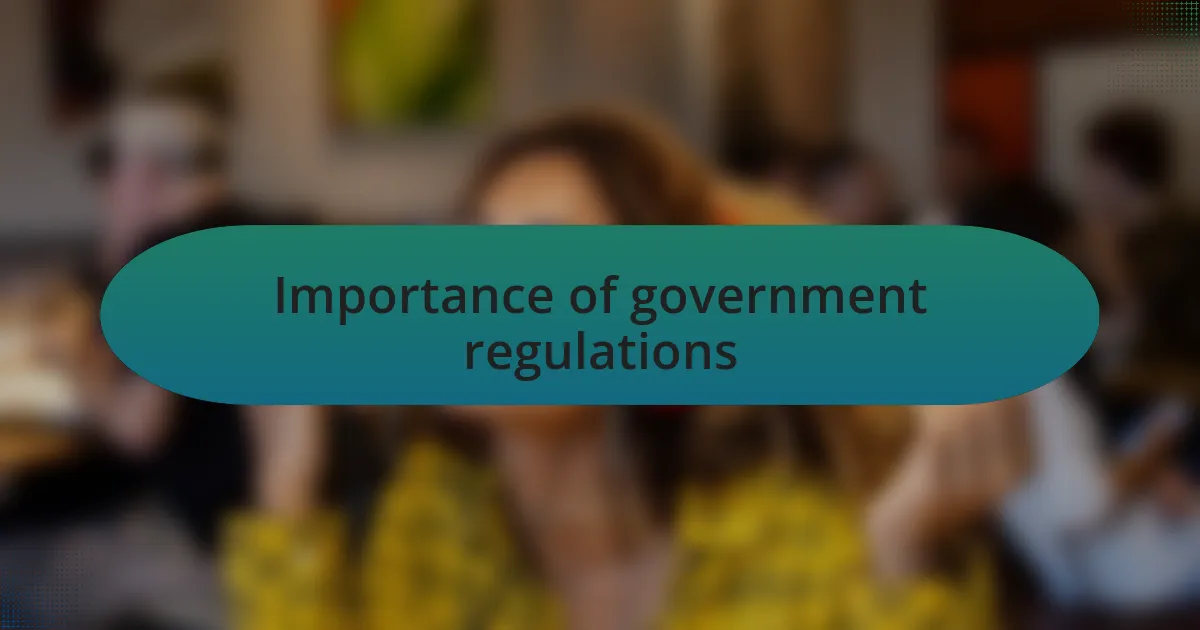
Importance of government regulations
Government regulations play a vital role in ensuring the integrity and fairness within the media landscape, especially for audio news aggregators. I’ve seen firsthand how these regulations can help level the playing field, keeping larger corporations in check while giving independent podcasters a fighting chance. Have you ever wondered how much more diverse our news sources become when everyone starts on an equal footing?
Regulations also protect consumers by ensuring that the information we receive is accurate and reliable. I remember a time when I stumbled upon a sensational story that turned out to be false, and it left me questioning what I could trust. That experience highlighted just how essential it is to have guidelines in place—without them, misinformation can easily spread like wildfire.
Moreover, regulations can foster innovation in the audio news space, encouraging new ideas while maintaining ethical standards. I can recall excitedly trying out a new audio platform, only to discover it followed robust ethical guidelines. It’s refreshing to see companies committed to both creativity and responsibility, and this balance is made possible through effective government oversight. Isn’t it reassuring to know that regulation not only safeguards us but also supports the evolution of quality content?
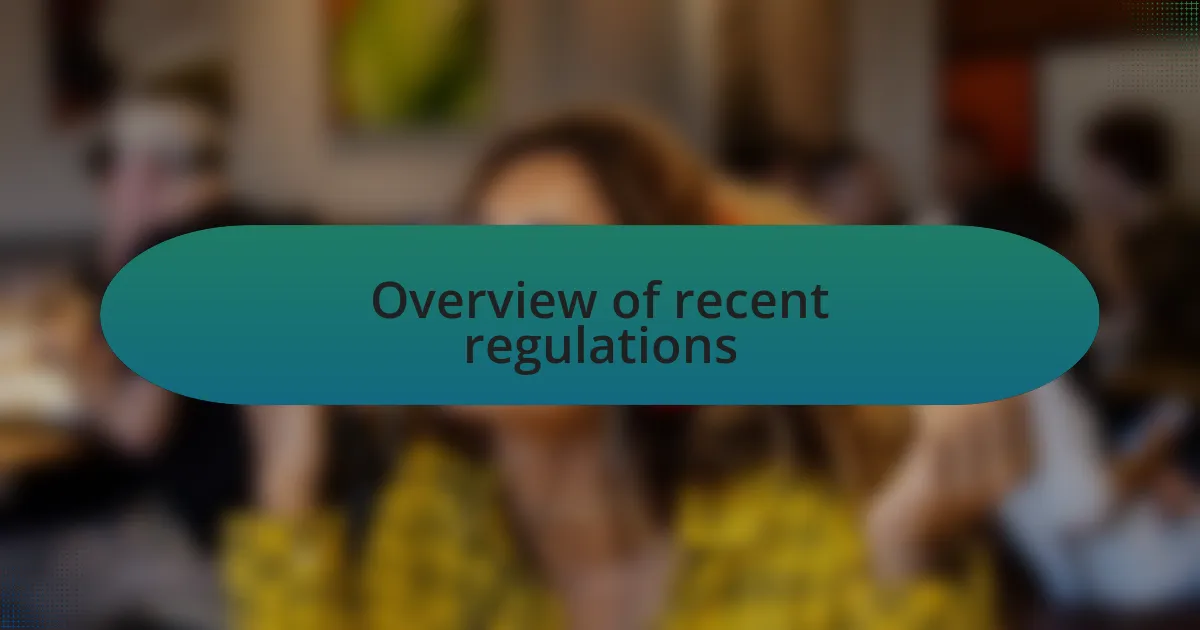
Overview of recent regulations
Recent government regulations have emerged to address the rapidly changing landscape of audio news aggregators. I’ve observed that these regulations focus on transparency in content sourcing and copyright compliance. This shift is not just about protecting creators; it’s about fostering public trust. How often do we consume audio content without knowing the source’s authenticity?
Additionally, new rules emphasize the importance of data privacy for users of audio platforms. I remember discussing with a friend how unsettling it can feel when your listening habits are tracked without your permission. With these regulations in place, listeners can feel more secure, knowing that their personal information is safeguarded against misuse.
Finally, there’s an increasing push for diversity and inclusion in content representation. From my experience, a wider range of voices enhances the richness of our media. Have you ever stumbled upon a podcast that opened your eyes to perspectives you never considered? It’s these new regulations that aim to ensure that a variety of viewpoints can find their way into the audio news landscape, enriching our listening experience.
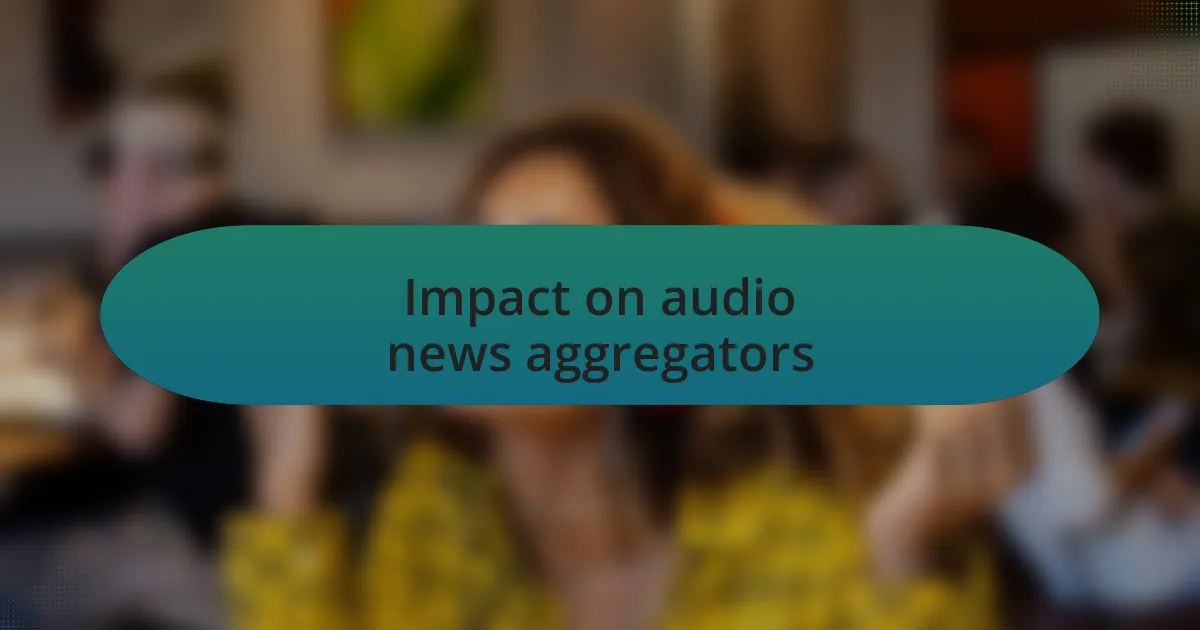
Impact on audio news aggregators
The impact of these regulations on audio news aggregators is significant. For instance, I recall a time when I stumbled upon a fantastic podcast, only to discover later that the source was questionable. These new rules ensure that aggregators must provide clear attribution, protecting both listeners and creators. How reassuring is it to know that we can trust the content we consume?
Moreover, the data privacy requirements compel aggregators to rethink their approach to user information. I often discuss with fellow enthusiasts how intrusive ads can detract from the listening experience. Now, with regulations in place, aggregators will be more accountable, allowing users to enjoy content without the shadow of surveillance lurking over them.
In terms of diversity and inclusion, I’ve found that when aggregators embrace a variety of content, it sparks richer conversations. I remember sharing a recent episode with friends, highlighting voices that aren’t often represented. The excitement was palpable as we engaged in discussions that broadened our perspectives. With these new regulations, the audio landscape can only become more vibrant and multifaceted. Isn’t it exciting to think about the possibilities for innovation and representation?
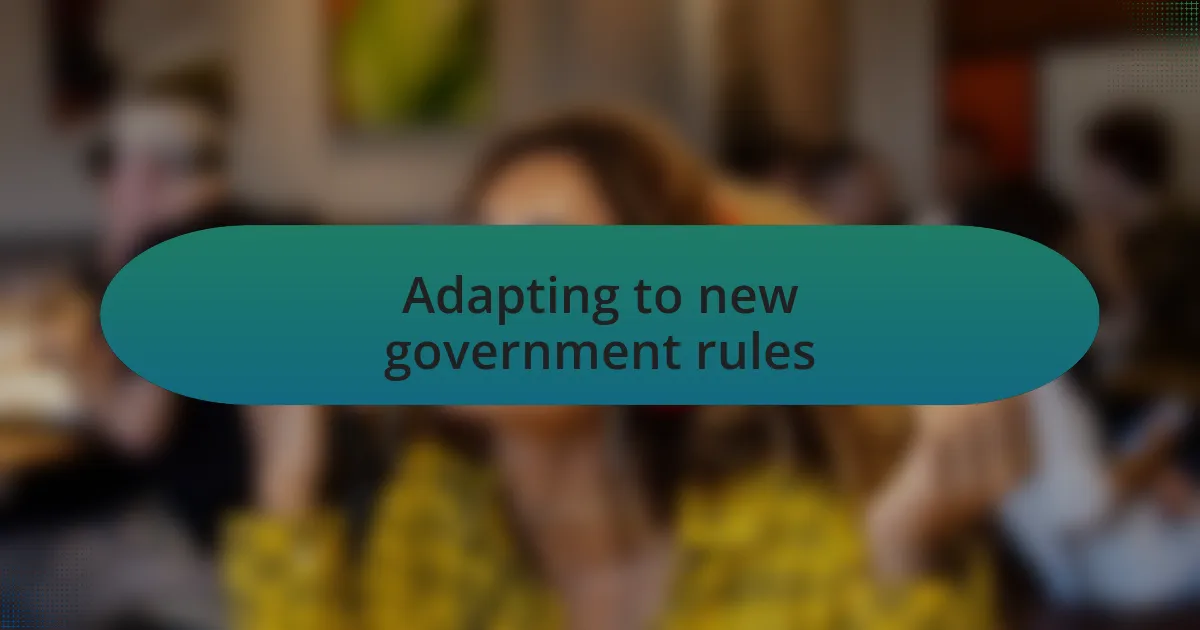
Adapting to new government rules
Adapting to new government rules means that audio news aggregators have to shift their strategies significantly. I remember when one of my favorite platforms changed its user interface to prioritize transparency around sources. Initially, it felt confusing, but over time, I appreciated how it fostered a sense of trust. Isn’t it refreshing when content feels reliable?
As I navigated the new privacy measures, I reflected on my own listening habits. I used to click through a myriad of popup ads without a second thought, yet I found myself more willing to support platforms that respect my data. This shift not only enhances user loyalty but also encourages aggregators to innovate in how they monetize content. Have you noticed more engaging, less intrusive ways of delivering ads as a result?
The challenge of embracing inclusivity is another layer that these rules introduce. I cherish the moments I’ve spent discovering underrepresented voices in the audio space, often leading me to powerful stories I would have missed otherwise. Now, with new diversity mandates, I believe we’ll see more pathways for artists and creators to share their narratives. Doesn’t that inspire hope for a richer listening experience?

Personal insights on compliance strategies
Compliance strategies for audio news aggregators are more crucial than ever, especially as regulations evolve. I recall a time when I had to quickly adapt my own approach to content curation after a sudden policy change. It felt overwhelming initially, but with a clear plan and open lines of communication, I found a way to keep my audience informed without sacrificing quality. Isn’t it fascinating how structured compliance can actually enhance our creative process?
In my experience, fostering a culture of compliance within teams has proven to be incredibly effective. When I encouraged my colleagues to actively participate in understanding the regulations, I noticed a remarkable increase in accountability and innovation. This collaborative atmosphere not only made the transition smoother but also inspired everyone to think creatively about how to meet compliance requirements. Have you considered how involving your team might strengthen your compliance strategies?
I also believe that investing in technology can simplify compliance. For instance, when I integrated automated tools for tracking content rights and licensing, it significantly reduced the time we spent worrying about compliance issues. This allowed me to focus more on curating high-quality audio content for our listeners. Isn’t it empowering to realize that technology can turn a challenge into an opportunity?